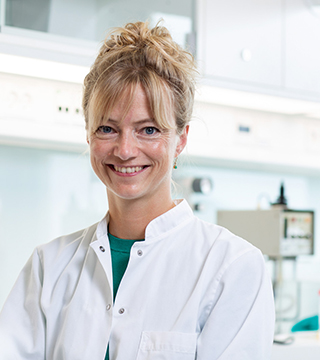Hanne Bjerregaard Møller

“In one of my current projects, we characterise a mutation in aquaporin-2 causing a severe form of congenital nephrogenic diabetes insipidus. I am driven by the hope that our research can some day help patients suffering from water balance disorders or intestinal dysfunction.”
Throwing water on fire – improving abnormal fluid transport in the kidney and intestines
How can we improve the treatment for patients suffering from water balance disorders or from intestinal dysfunction such as diarrhea caused by excess bile acids in the large intestine? That is a central theme for associate professor Hanne Bjerregaard Møller, born 1976, who is a medical doctor and researcher in the field of water and electrolyte transport across cell membranes.
In the kidney, the consequence of dysregulated fluid transport may be either water retention or loss of body water. In the intestines, dysfunction may cause diarrhea or constipation.
For years, the focal point of Hanne Bjerregaard Møller’s research has been regulation of the water channel protein aquaporin-2 in the kidney. The protein is fundamental for the ability to concentrate urine and thus conserve body water. Lack of proper aquaporin-2 expression and function can be seen as a side effect to e.g. lithium treatment or in rare cases as an inherited condition. The resulting disease, nephrogenic diabetes insipidus is characterized by production of large quantities of dilute urine – 2-20 liters per day. A condition making these patients prone to severe dehydration. Currently, the treatment options for the disease are limited.
“In one of my current projects, we characterise a mutation in aquaporin-2 causing a severe form of congenital nephrogenic diabetes insipidus. We use cell model systems to determine how this mutation is handled at the cellular level. I am driven by the hope that our research can some day help patients suffering from water balance disorders or intestinal dysfunction,” Hanne Bjerregaard Møller says – referring to the fact that the colonic epithelia in many ways resemble the epithelia of the kidneys.
In the intestines, Hanne Bjerregaard Møller’s group examine other membrane transport proteins to determine if changed expression in cell and animal models as well as in patient biopsy material contributes to the development of bile acid diarrhea. She aims to understand if bile acids directly affect the transport of electrolytes and water in the colonic epithelium and thereby cause symptoms.

“We characterise a mutation in aquaporin-2 causing a severe form of congenital nephrogenic diabetes insipidus. I hope that our research can some day help patients suffering from water balance disorders or intestinal dysfunction.”